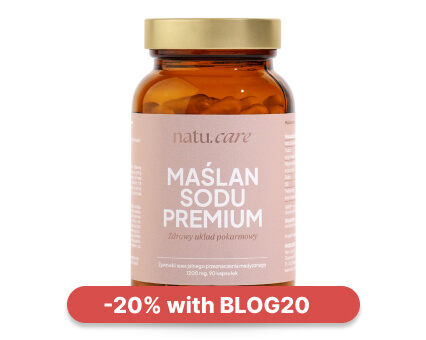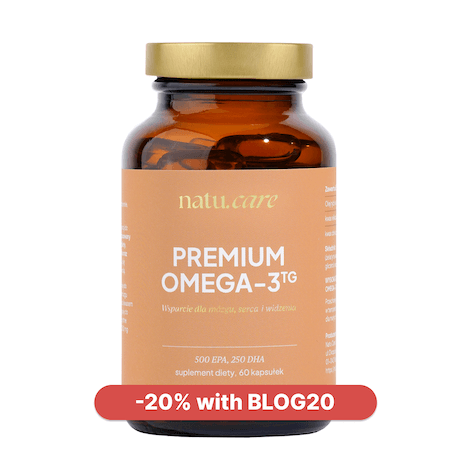20+ questions about blood donation - a guide on how to become a donor
Answers to more than 20 questions about blood donation that may be bothering you before your first donation.


Learn more about our editorial process
.

Learn more about our editorial process
.

Learn more about our editorial process
.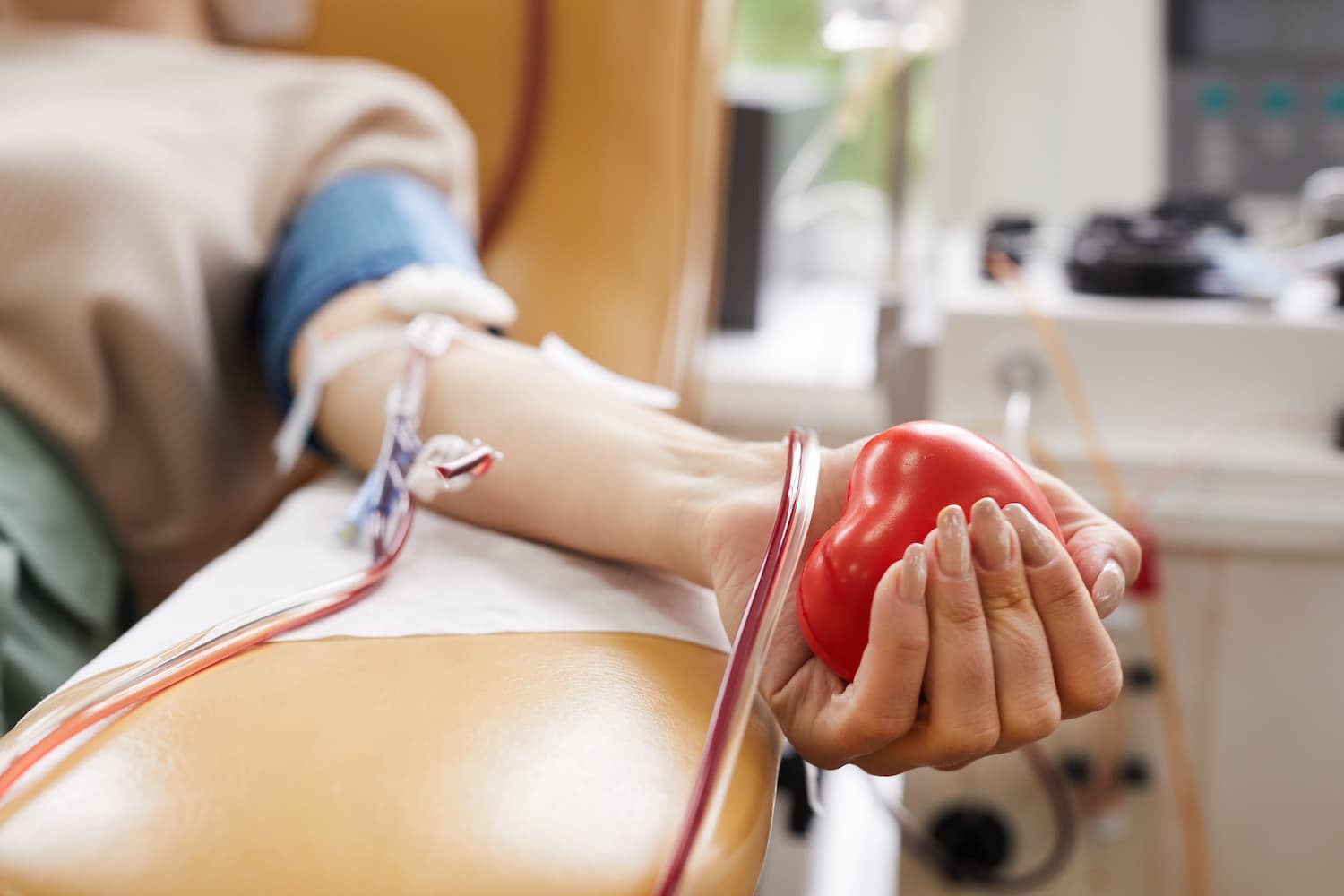
Why you can trust us
Articles on Natu.Care are written based on scientific research, data from government websites and other reliable sources. The texts are written in cooperation with doctors, nutritionists and other health and beauty experts. Articles are reviewed before publication and during significant updates.
.Learn more about our editorial process
.Information about advertisements
Content on Natu.Care may contain links to products from the sale of which we may receive a commission. When creating content, we adhere to high editorial standards and take care to be objective about the products discussed. The presence of affiliate links is not dictated by our partners, and we select the products we review ourselves completely independently.
.Learn more about our terms and Conditions
.Oil is said to be black gold because of its value. But there is a more valuable substance with a different colour - red. It is blood.
"I had a motorbike accident. My pelvis was in pieces, which caused massive bleeding. I got blood already on the operating table. If it hadn't been for that, I wouldn't be here," Konrad recounts.
It's the 21st century.
We are in the 21st century: the first passenger space flight recently took place, and we still don't know how to produce artificial blood. The only way to obtain this precious medicine is to collect it from a donor. Would you like to become one of them? Find out all about how to donate some of your red gold below.
From this article you will learn:
.- How Polish blood donation looks like in numbers.
- Who can become a blood donor?
- Who can become a donor. .
- How to prepare for blood donation and what the whole process looks like.
- How to prepare for blood donation and what the whole process looks like.
See also:
- Bone Marrow Donor Day .
- Clean Air Day
- Tobacco Cessation Day
- Fish Day
- What is anaemia
- What is carbonation
- Blood tests
- Cervical cancer
- Lung health after a pandemic
- How to take care of your health
- Aspartame on the WHO blacklist
What kind of blood is most in short supply?
.All over Poland the most urgent need is for type 0 Rh- blood and. If you have this blood type and want to do some good, pull up your sleeves and march to the donation point.
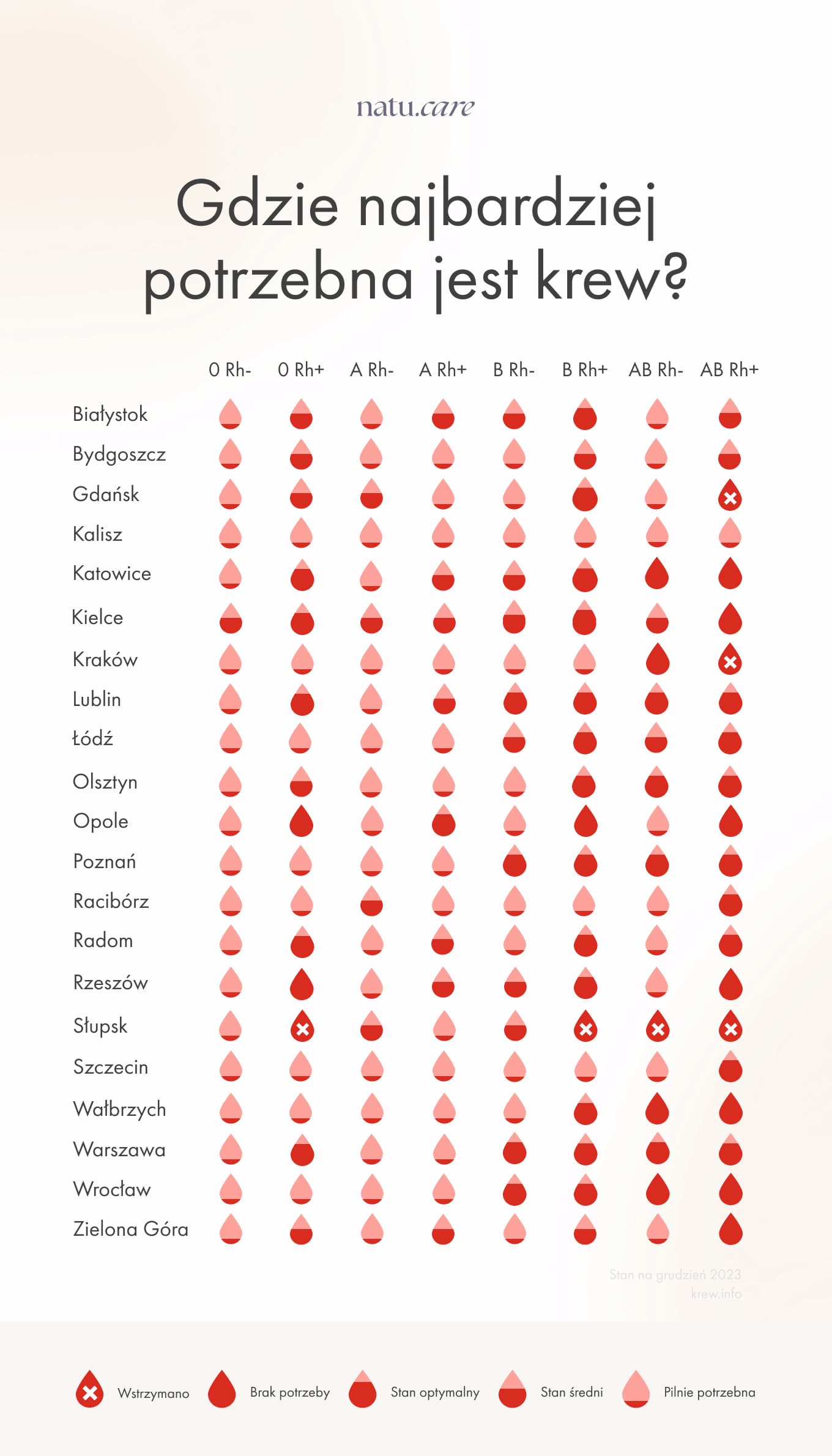
Interesting facts
The Man with the golden arm, or James Harrison, is an Australian blood donor whose blood contains a rare anti-D immunoglobulin. It helps treat newborns at risk of serological conflict. The man donated a total of 1,077 units of blood and blood components. It is estimated that he could have saved more than two million children with this.
How many people in Poland donate blood?
.According to the Central Statistical Office, more than 612,000 people in Poland had the status of an honorary blood donor in 2017and. In 2021, overall, the highest number of blood donations were made by residents of Warsaw, Katowice and Krakow.
.|
City . |
Donors |
Donors per 1000 |
Population . |
|
|
Warsaw . |
59556 |
32 |
1863056 |
|
|
Katowice |
52687 |
186 |
282755 |
|
|
Cracow |
48327 |
60 |
802583 |
|
|
Poznań |
44899 |
82 |
545073 |
|
|
Wrocław |
38023 |
56 |
674312 |
|
|
Lodz |
37122 |
56 |
664860 |
|
|
Bydgoszcz |
36045 |
108 |
334026 |
|
|
Reszów |
30553 |
156 |
196374 |
|
|
Lublin |
29464 |
89 |
332852 |
|
|
Bialystok |
29231 |
100 |
293413 |
|
|
Gdansk |
29016 |
60 |
486271 |
|
|
Szczecin |
23243 |
59 |
394482 |
|
|
Calisz |
22694 |
239 |
95021 |
|
|
Olsztyn |
19363 |
114 |
169251 |
|
|
Kielce |
16825 |
91 |
185478 |
|
|
Green Mountain |
16176 |
116 |
139667 |
|
|
Opole |
14436 |
114 |
126775 |
|
|
Racibórz |
13151 |
259 |
50743 |
|
|
Walbrzych |
12697 |
123 |
103263 |
|
|
Radom |
12147 |
61 |
199904 |
|
|
Slupsk |
9534 |
109 |
87119 |
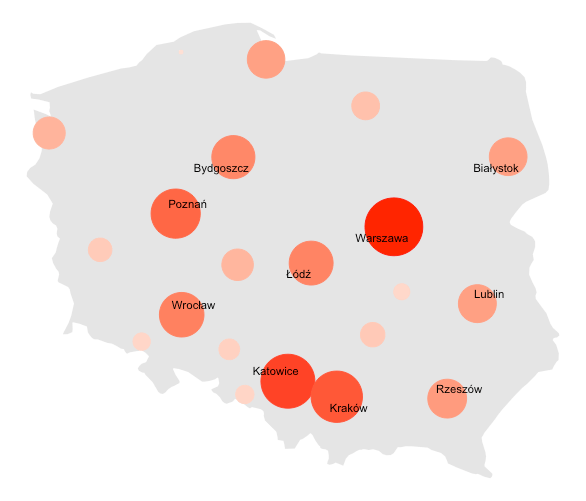
We know - big cities, lots of donors. However, when we look at the number of blood donations per 1,000 inhabitants, other towns come to the fore: Racibórz, Kalisz and only Katowice maintains its place on the podium. Bravo!
.|
City |
Donors |
Donors per 1000 |
Population . |
|
|
Racibórz |
13151 |
259 |
50743 |
|
|
Calisz |
22694 |
239 |
95021 |
|
|
Katowice |
52687 |
186 |
282755 |
|
|
Reszów |
30553 |
156 |
196374 |
|
|
Walbrzych |
12697 |
123 |
103263 |
|
|
Green Mountain |
16176 |
116 |
139667 |
|
|
Olsztyn |
19363 |
114 |
169251 |
|
|
Opole |
14436 |
114 |
126775 |
|
|
Slupsk |
9534 |
109 |
87119 |
|
|
Bydgoszcz |
36045 |
108 |
334026 |
|
|
Bialystok |
29231 |
100 |
293413 |
|
|
Kielce |
16825 |
91 |
185478 |
|
|
Lublin |
29464 |
89 |
332852 |
|
|
Poznań |
44899 |
82 |
545073 |
|
|
Radom |
12147 |
61 |
199904 |
|
|
Cracow |
48327 |
60 |
802583 |
|
|
Gdansk |
29016 |
60 |
486271 |
|
|
Szczecin |
23243 |
59 |
394482 |
|
|
Wrocław |
38023 |
56 |
674312 |
|
|
Lodz |
37122 |
56 |
664860 |
|
|
Warsaw |
59556 |
32 |
1863056 |
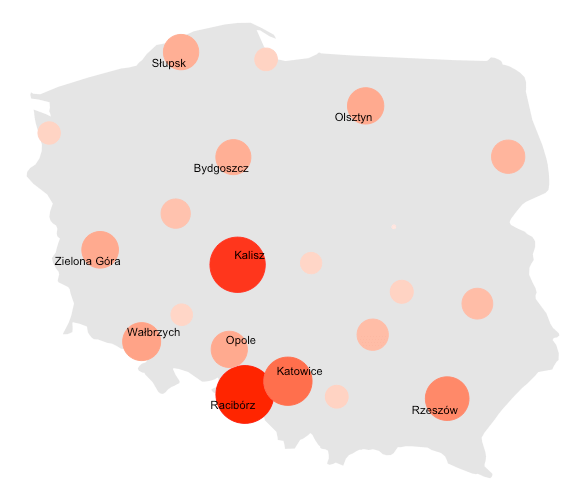
How has COVID-19 affected Polish blood donations?
.Since 2011, the number of whole blood donations in Poland has remained above 1 160 000 per yearand. With the exception of a few years of slight decline, the upward trend continued. The collapse came with 2020, when the COVID-19 pandemic raged.
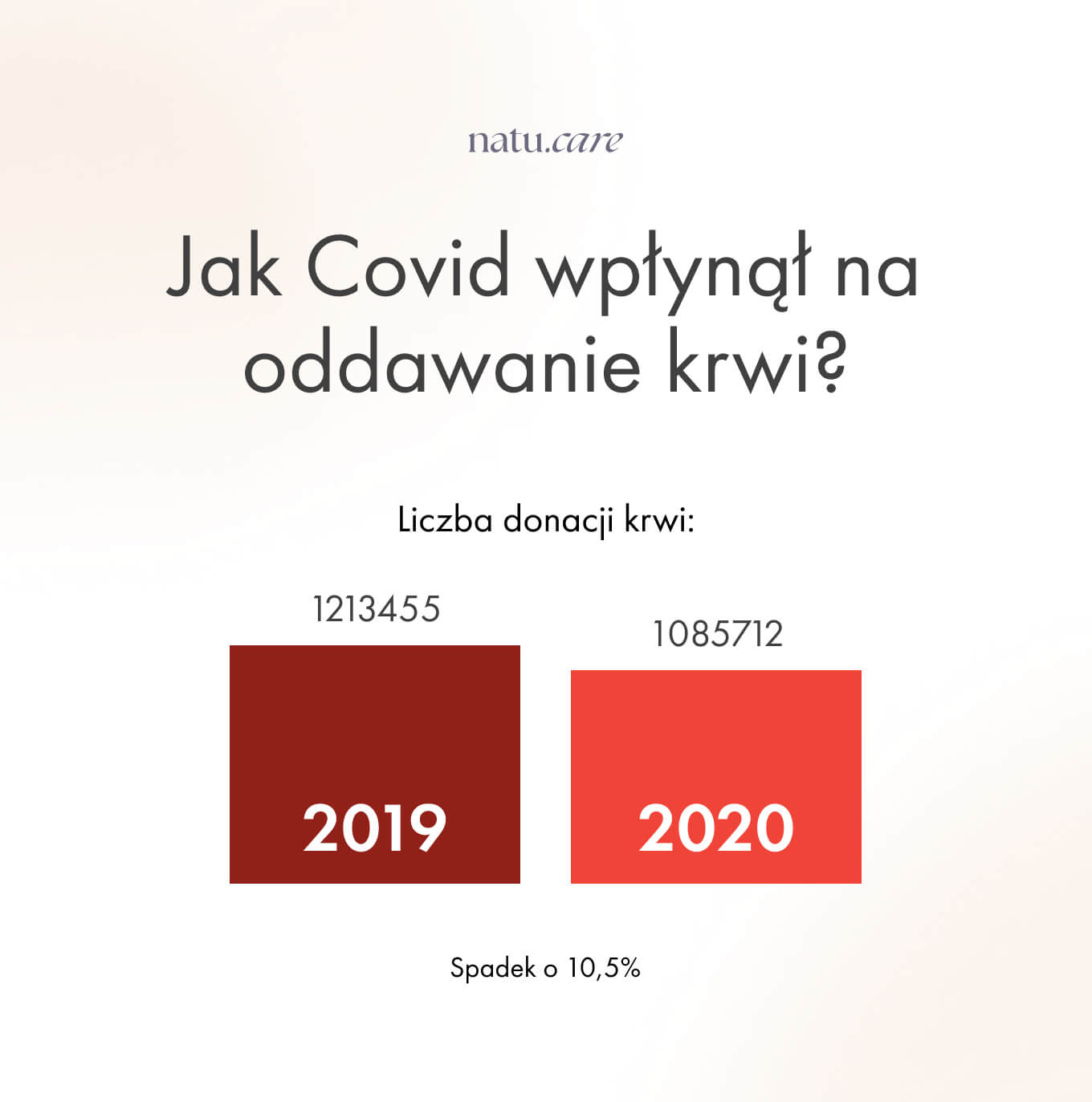
Happily, the situation is returning to normal and, according to the latest statistics, 2022 could be a record year for donations.
Natu.Care Collagen Premium 5000 mg, mango & passion fruit

- Collagen content: 5000 mg marine collagen hydrolysate
- Additional active ingredients: vitamin C, low molecular weight hyaluronic acid (and L-theanine and coenzyme Q10 in cocoa flavoured collagen or vitamin A and vitamin E in mango–passion fruit flavoured collagen)
- Form: powder sachets
- Dose: 1 sachet per day
- Sufficient for: 30 days
Product description
Fish collagen from the Natu.Care brand in a dose of 5000 mg, based on certified ingredients of the best quality. Regular supplementation will positively influence the appearance of the skinóry, hairów and nails – they will be rebuilt and strengthened from the inside.
In addition to collagen, which is valuable for health and beauty, it also offers other active ingredients that help to maintain a youthful complexion, shiny hair and strong nails.
The formula contains a sufficient portion of the active ingredient to positively affect joints, the musculoskeletal system and immunity.
Natu.Care Premium Collagen is available in two flavours – Cacao Bloom and Rise&Shine. Both formulas are based on the following active ingredients: marine collagen hydrolysate, wild roseóbud extract and hyaluronic acid.
Additionally, Cacao Bloom contains natural L-theanine, coenzyme Q10 and defatted Dutch cacao. Rise&Shine instead contains vitamin E and vitamin A.
These are the best collagens in the world.
These best fish collagens on the market also rós taste – Cacao Bloom is a treat for chocolate lovers. Rise&Shine will appeal to those whoólike the refreshing taste of mangoófruit and passion fruit.
Pros and cons
Pros:
- Vitamin C supports the body's collagen production, enhancing its effectiveness.
- An effective dose of hyaluronic acid, which additionally supports skin hydration and joint health.
- Fish collagen absorbs 50% better. Additionally, the manufacturer specifies the fish species it is sourced from (Atlantic cod).
- The composition has been tested by the independent and accredited J.S. Hamilton laboratory.
- MSC (Marine Stewardship Council) quality certification, which confirms that the collagen source supports sustainable fishing practices.
Cons:
- None.
Additional information
Natu.Care's fish collagen receives praise for its delicious taste. You won't find the fishy aftertaste that often comes through in other collagens. Plus, you have two tasty flavors to choose from: cocoa and mango-passionfruit.
Active ingredients like coenzyme Q10, hyaluronic acid, and natural L-theanine provide anti-inflammatory and antioxidant benefits while slowing down aging processes.
User review
Super, after about 6 weeks of use, the skin on my face became noticeably firmer. Wonderful taste.
Ania ZalewskaNatu.Care customer
Natu.Care Premium collagen 10 000 mg, mango-maracuja
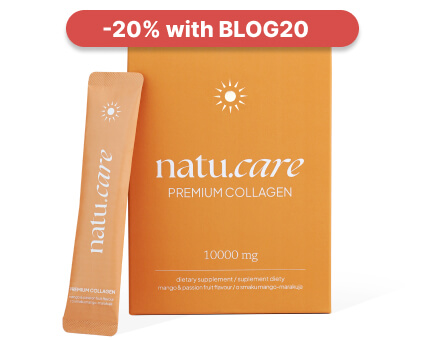
- Collagen content: 10,000 mg marine collagen hydrolysate
- Additional active ingredients: vitamin C, low molecular weight hyaluronic acid (and L-theanine and coenzyme Q10 in cocoa flavoured collagen or vitamin A and vitamin E in mango–passion fruit flavoured collagen)
- Form: powder sachets
- Dose: 1 sachet per day
- Sufficient for: 30 days
Product description
One of the strongest collagens on the market, whichós provides as much as 10,000 mg in a daily serving. This allows the formula to effectively support the condition of the skin, hair and nails.
With this supplement, you will support your beauty, which will allow you to visually stop the ageing process and feel a second youth!
Natu.Care Collagen Premium 10 000 mg comes in two flavours – cherry and mango-maracuja. Both formulas have the same product backbone – collagen, hyaluronic acid and vitamin C.
In the cherry version you additionally find glucosamine, chondroitin and Indian frankincense resin extract. Mango-maracuja, on the other hand, contains vitamin E and vitamin A.
Pros and cons
Pros:
- Tested collagen formula – SeaGarden, whose effects have been confirmed in clinical studies.
- Effective dose of hyaluronic acid, additionally moisturizing the skin and positively impacting joint health.
- Vitamin C supports the body’s natural collagen production.
- The composition has been tested by the independent and accredited J.S. Hamilton laboratory.
- The product has an MSC (Marine Stewardship Council) quality certification – the collagen source supports sustainable fishing practices.
Cons:
- None.
Additional information
Users praise Natu.Care Collagen Premium for the easy dissolvability of the powder.
User review
I noticed a significant improvement in my skin texture after a few weeks of taking collagen regularly. My complexion is now as soft as velvet!
Natu.Care Collagen Premium 10000 mg, cherry

- Collagen content: 10,000 mg of hydrolyzed bovine collagen
- Additional active ingredients: vitamin C, low molecular weight hyaluronic acid, glucosamine, chondroitin, extract of Indian frankincense resin (boswellia serrata)
- Form: powder sachets for drinking
- Serving: 1 sachet per day
- Lasts for: 30 days
Product description
One of the strongest collagens on the market, providing as much as 10,000 mg per daily serving. This product can effectively support the condition of joints, skin, hair, and nails.
With this supplement, you will support your skeletal and joint system as well as your beauty, helping you visually halt the aging process and feel rejuvenated!
Pros and cons
Pros:
- The daily portion of collagen is very large – as much as 10,000 mg.
- Proven collagen formula – COLLinstant, whose effectiveness has been confirmed in clinical studies.
- Effective dose of hyaluronic acid, which additionally moisturizes the skin and positively affects joint health.
- Vitamin C supports the body's natural collagen production.
- Glucosamine is a fundamental building block of compounds found in joint cartilage and a component of collagen that gives elasticity to connective tissue in tendons.
- Chondroitin is a natural component found in the human body, mainly in cartilage. This large molecule (mucopolysaccharide) has the ability to absorb water, which helps maintain the elasticity and resilience of cartilage.
- Frankincense resin extract supports blood circulation and joint mobility and reduces their stiffness. It may help alleviate inflammatory conditions.
- The composition has been tested by the independent and accredited J.S. Hamilton laboratory.
Cons:
- None.
Additional information
Users praise Natu.Care Collagen Premium for the easy dissolving of the powder.
Premium Sodium Butyrate
Product description
Premium Sodium Butyrate is a natural support for your digestive system. With a high dose of butyric acid (940 mg), it supports the regeneration of the intestinal mucosa, improving gut health and function, and aids in the absorption of nutrients. By taking care of your intestines, you're taking care of the health of your entire body.
Studies involving people suffering from irritable bowel syndrome confirm that sodium butyrate is ideal for supporting issues related to bacterial flora imbalances (for example, after antibiotic therapy), constipation and diarrhea, inflammation of the intestinal mucosa, or a diet low in fiber.
Premium Sodium Butyrate capsules are made using the innovative DRcaps® technology. This guarantees that the active ingredients in the product are protected from the destructive effects of stomach acids and digestive enzymes. As a result, we can be sure that the beneficial ingredients are released in the small intestine and are fully absorbed by our body.
Premium Sodium Butyrate from Natu Care is 100% tested, and its composition contains only the highest quality raw materials.
Pros and cons
Pros:
- Supports digestive system function
- Helpful for various gastrointestinal conditions, including IBS
- High dose of butyric acid in each capsule
- Eco-friendly, clean, and tested composition
- Free from added sugar, gluten, GMOs, and lactose
- Innovative capsule technology - DRcaps
Cons:
- None
Additional Information
Take 3 capsules daily at any time of the day, preferably with a meal. Swallow the capsules whole with water.
Premium Sodium Butyrate is intended for adults.
The product should be used under medical supervision.
User review
I've been using the product for 2 weeks. My stomach feels lighter, and my digestion has improved. I recommend it.
Natu.Care Premium Magnesium + Vitamin B6

- Magnesium content per day: 305 mg
- Additional active ingredients: Vitamin B6 (2.1 mg)
- Form: capsules
- Serving size: 3 capsules per day
- Sufficient for: 30 days
Product description
The Premium Magnesium + Vitamin B6 dietary supplement is a comprehensive product that combines three organic forms of magnesium (citrate, malate, and diglycinate) and vitamin B6 in highly absorbable forms.
Magnesium is an essential mineral without which our bodies cannot function properly. It supports the immune, nervous, and muscular systems, maintains electrolyte balance, and is involved in cell division and the regulation of mental functions.
Research shows that magnesium supplementation is even more effective when accompanied by vitamin B6, which is included in our product. Vitamin B6 is responsible for the proper functioning of the nervous and immune systems, as well as the proper functioning of the heart.
If you want to safely get rid of feelings of fatigue, concentration problems, hair loss, muscle cramps, trembling, or irritability, reach for Premium Magnesium from Natu.Care, tested by the independent, certified laboratory J.S. Hamilton Poland.
Pros and cons
Pros
- Supports the proper functioning of the nervous and immune systems.
- Reduces feelings of fatigue and tiredness.
- Maintains proper psychological functions.
- The purity of the ingredients (free from anti-caking agents, artificial fillers, and additives such as titanium dioxide, microcrystalline cellulose, talc, magnesium stearate, and silicon dioxide) has been confirmed by laboratory tests.
- High absorption of ingredients.
- Soft capsules that are easy to swallow.
- Suitable for vegetarians and vegans.
Cons
- None.
Additional information
Take with a meal, 3 capsules per day.
The capsules should be taken with at least 250 ml of water.
If you have trouble sleeping, it is advisable to take 1 capsule in the morning and 2 capsules in the evening, no later than 4 hours before bedtime.
Avoid combining with products high in calcium (milk, yogurt, cheese), as this may negatively affect magnesium absorption.
Pregnant and breastfeeding women should consult a doctor before starting supplementation.
User review
I’m very impressed with the speed of delivery. The product itself is of high quality and absorbs well. After two weeks of supplementation, I’ve noticed a significant improvement in muscle recovery, especially during periods of intense training. I highly recommend it!
Product description
The dietary supplement contains omega-3ᵀᴳ, or omega-3 acids in the form of trójglyceridesów. Scientific studies suggest that this form of fatty acidsós up to 2 times better absorbed than the estersós present in many dietary supplements on the market. This means that you are assured of their effectiveness and of supplying yourself with valuable omega acids.
Fatty acids omega-3 are derived from wild anchovy oil. It is a rich source of healthy fats that are essential for the health of the cardiovascular, immune and nervous systems, as well as the proper function of vision, joints muscles.
Scientific research suggests that wild anchovies are a good source of healthy fats.
Scientific research also suggests that an adequate intake of omega-3 fatty acidsós protects against and supports the treatment of depression and anxiety disorders. In addition, omega-3s influence the hydration and appearance of the skinóry and support healthy sleep.
.
The formula contains a total of 750 mg of EPA+DHA acidsós, which is three times higher than the recommended minimum of 250 mg for the Polish population. Omega-3 TG Premium has studies indicating that its TOTOX is 9, which is a very good result.
Supplementation of omega-3 fatty acidsóis recommended for anyone who does not eat 1–2 portions (approximately 300 g) of oily fish per week. Children during growth, seniors, physically active people, vegans and vegetarians, as well as patients undergoing cardiovascular treatment and prevention of heart disease also have an increased need.
Pros and cons
The dietary supplement contains omega-3ᵀᴳ, or omega-3 acids in the form of trójglyceridesów. Scientific studies suggest that this form of fatty acidsós up to 2 times better absorbed than the estersós present in many dietary supplements on the market. This means that you are assured of their effectiveness and of supplying yourself with valuable omega acids.
Fatty acids omega-3 are derived from wild anchovy oil. It is a rich source of healthy fats that are essential for the health of the cardiovascular, immune and nervous systems, as well as the proper function of vision, joints muscles.
Scientific research suggests that wild anchovies are a good source of healthy fats.
Scientific research also suggests that an adequate intake of omega-3 fatty acidsós protects against and supports the treatment of depression and anxiety disorders. In addition, omega-3s influence the hydration and appearance of the skinóry and support healthy sleep.
.
The formula contains a total of 750 mg of EPA+DHA acidsós, which is three times higher than the recommended minimum of 250 mg for the Polish population. Omega-3 TG Premium has studies indicating that its TOTOX is 9, which is a very good result.
Supplementation of omega-3 fatty acidsóis recommended for anyone who does not eat 1–2 portions (approximately 300 g) of oily fish per week. Children during growth, seniors, physically active people, vegans and vegetarians, as well as patients undergoing cardiovascular treatment and prevention of heart disease also have an increased need.
Additional information
The dietary supplement contains omega-3ᵀᴳ, or omega-3 acids in the form of trójglyceridesów. Scientific studies suggest that this form of fatty acidsós up to 2 times better absorbed than the estersós present in many dietary supplements on the market. This means that you are assured of their effectiveness and of supplying yourself with valuable omega acids.
Fatty acids omega-3 are derived from wild anchovy oil. It is a rich source of healthy fats that are essential for the health of the cardiovascular, immune and nervous systems, as well as the proper function of vision, joints muscles.
Scientific research suggests that wild anchovies are a good source of healthy fats.
Scientific research also suggests that an adequate intake of omega-3 fatty acidsós protects against and supports the treatment of depression and anxiety disorders. In addition, omega-3s influence the hydration and appearance of the skinóry and support healthy sleep.
.
The formula contains a total of 750 mg of EPA+DHA acidsós, which is three times higher than the recommended minimum of 250 mg for the Polish population. Omega-3 TG Premium has studies indicating that its TOTOX is 9, which is a very good result.
Supplementation of omega-3 fatty acidsóis recommended for anyone who does not eat 1–2 portions (approximately 300 g) of oily fish per week. Children during growth, seniors, physically active people, vegans and vegetarians, as well as patients undergoing cardiovascular treatment and prevention of heart disease also have an increased need.
Expert opinion
The dietary supplement contains omega-3ᵀᴳ, or omega-3 acids in the form of trójglyceridesów. Scientific studies suggest that this form of fatty acidsós up to 2 times better absorbed than the estersós present in many dietary supplements on the market. This means that you are assured of their effectiveness and of supplying yourself with valuable omega acids.
Fatty acids omega-3 are derived from wild anchovy oil. It is a rich source of healthy fats that are essential for the health of the cardiovascular, immune and nervous systems, as well as the proper function of vision, joints muscles.
Scientific research suggests that wild anchovies are a good source of healthy fats.
Scientific research also suggests that an adequate intake of omega-3 fatty acidsós protects against and supports the treatment of depression and anxiety disorders. In addition, omega-3s influence the hydration and appearance of the skinóry and support healthy sleep.
.
The formula contains a total of 750 mg of EPA+DHA acidsós, which is three times higher than the recommended minimum of 250 mg for the Polish population. Omega-3 TG Premium has studies indicating that its TOTOX is 9, which is a very good result.
Supplementation of omega-3 fatty acidsóis recommended for anyone who does not eat 1–2 portions (approximately 300 g) of oily fish per week. Children during growth, seniors, physically active people, vegans and vegetarians, as well as patients undergoing cardiovascular treatment and prevention of heart disease also have an increased need.
Natu.Care Vitamin D 2000 UI
Product description
Vitamin D plays a crucial role in our health and well-being. It affects calcium and phosphate metabolism, which translates to healthy bones and teeth. It also helps regulate the immune system, and studies indicate its influence on the functioning of the nervous system.
Vitamin D, although called a “vitamin,” is actually a prohormone that our body produces on its own, primarily under the influence of sunlight. Unfortunately, our modern lifestyle contributes to deficiencies of this essential vitamin. Working in enclosed office buildings, using (necessary!) SPF creams, and covering the body with clothing all make it very difficult, if not impossible, to obtain adequate levels of vitamin D from sunlight. This is why appropriate, year-round supplementation is so crucial.
Vitamin D from Natu.Care is a well-tested vitamin D3 suspended in safflower oil, a plant known for its numerous health benefits. The convenient, easy-to-swallow capsule will make supplementation a part of your daily, healthy routine, improving your overall well-being.
Pros and cons
Pros:
- Ensures proper functioning of the immune system
- Supports the maintenance of healthy bones and teeth
- Maintains proper heart, kidney, and muscle function
- Tested by an independent, certified laboratory
- Convenient and easy-to-swallow capsule
- Clean composition - free from added sugar, gluten, GMOs, lactose, and without preservatives or colorants
Cons:
- None.
Additional Information
Pregnant women and breastfeeding mothers should consult a doctor before using the product. This dietary supplement is intended for a healthy adult population up to the age of 75.
Collagen Booster - Glow Stories
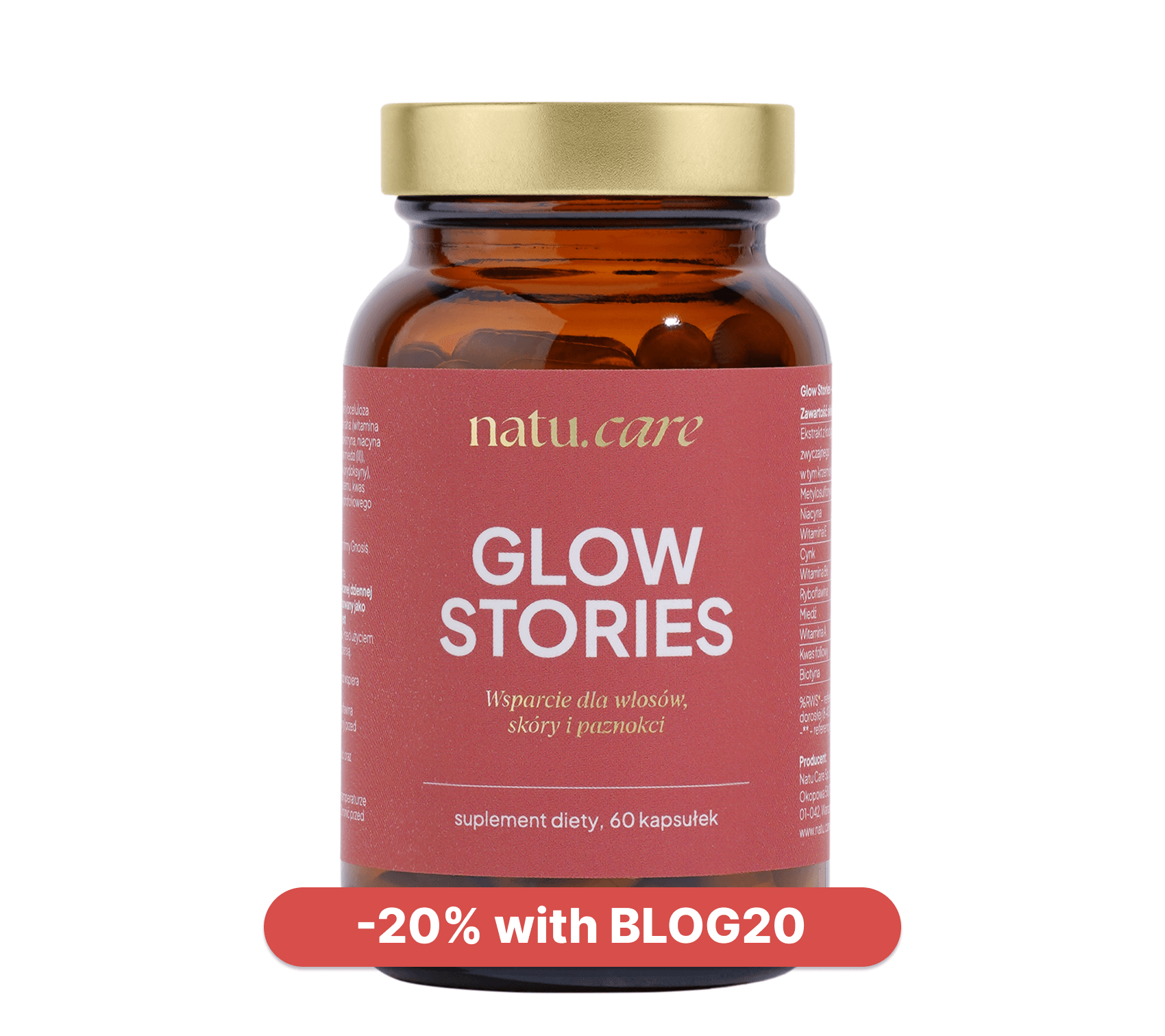
- Active ingredients: bamboo shoot extract, Quatrefolic®, L-Methionine, L-cysteine, vitamin E, vitamin A, niacin (vitamin B3), vitamin B6, vitamin B2 (riboflavin), biotin, zinc, copper
- .
- Form: capsules
- .
- Dose: 1 capsule per day
- .
- Sufficient for: 60 days
- .
Product description
A dietary supplement containing vitamins, minerals and plant extracts thatósupport the skinóhand, hair and nails. The product is especially distinguished by the form of folate – it is Quatrefolic, whichós absorbed very well and is natural.
In addition to valuable vitamins and minerals, such as vitamin A, E, B3, B2 and biotin, the formula contains bamboo shoot extract, whichóry further enhances your beauty.
Pros and cons
A dietary supplement containing vitamins, minerals and plant extracts thatósupport the skinóhand, hair and nails. The product is especially distinguished by the form of folate – it is Quatrefolic, whichós absorbed very well and is natural.
In addition to valuable vitamins and minerals, such as vitamin A, E, B3, B2 and biotin, the formula contains bamboo shoot extract, whichóry further enhances your beauty.
Additional information
A dietary supplement containing vitamins, minerals and plant extracts thatósupport the skinóhand, hair and nails. The product is especially distinguished by the form of folate – it is Quatrefolic, whichós absorbed very well and is natural.
In addition to valuable vitamins and minerals, such as vitamin A, E, B3, B2 and biotin, the formula contains bamboo shoot extract, whichóry further enhances your beauty.
Who donates blood most often?
.The average Polish blood donor is a man aged 25-44. In 2021, this group accounted for almost half of all donors. Leaving aside the age criterion, two-thirds of donors are menand.
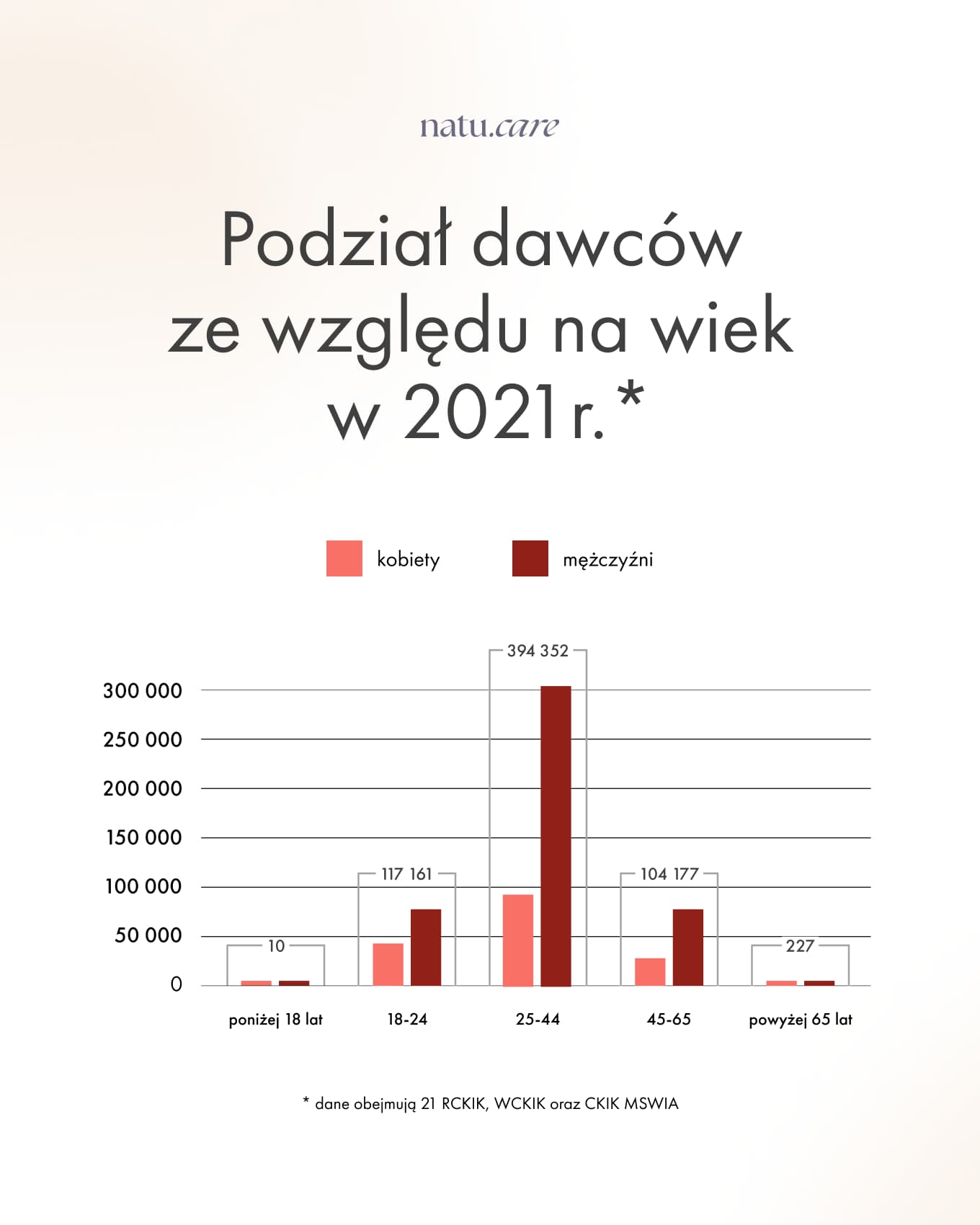
Who can donate blood?
.According to the Public Blood Service Act, you can become a blood donor ifand:
- you are between the ages of 18-65, .
- you have given written consent for blood donation, .
- you have no contraindications (which you will read about below). .
In exceptional circumstances, blood can also be drawn from a person who is 17 years of age or older and whose legal representative (usually a parent) has given their consent.
What are the contraindications to blood donation?
.Unfortunately, not everyone can become a donor. Serious chronic illnesses in particular may disqualify you.
Responsible donors are.
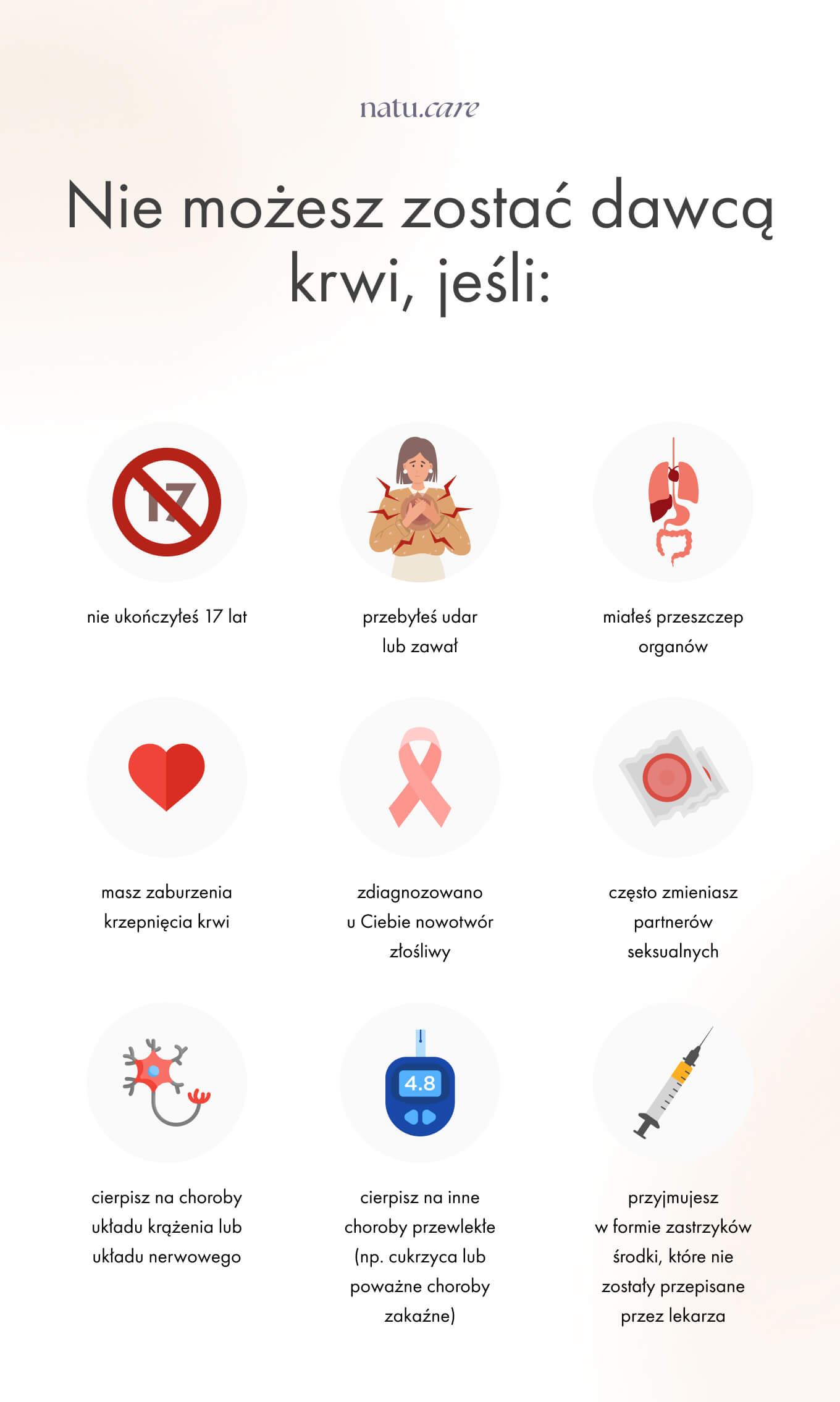
When do you need to hold off on donating blood?
.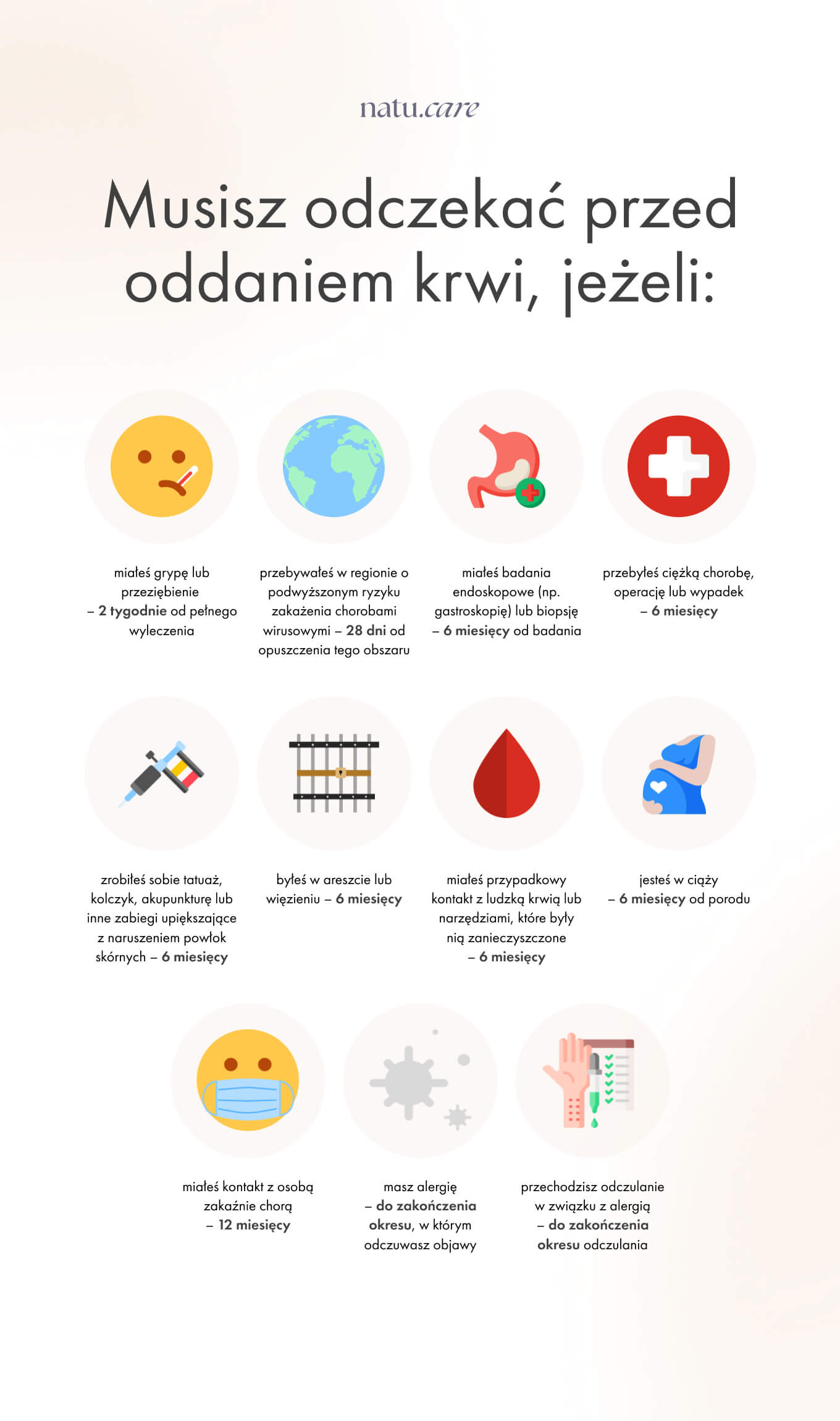
Some medical conditions and conditions do not exclude you from being a donor, however, they do make it necessary for you to wait a certain period of time before you can donate bloodand.
.5 years after cure
.|
Cause . |
Disqualification time . |
||
| . |
Q fever |
2 years after cure |
|
|
Toxoplasmosis |
6 months from the date of cure |
||
|
Tuberculosis |
2 years after cure |
||
|
Rheumatic fever |
2 years from cessation of symptoms if you did not get chronic heart disease |
||
|
Bone marrow inflammation |
2 years after cure |
||
|
Malaria |
Minimum 4 months after completion of treatment and resolution of symptoms. Click for details. |
||
|
You were in a region at high risk of infection with viral diseases |
Minimum 28 days after leaving the area . |
||
|
Tuberculosis |
12 months after cure |
||
|
Infectious mononucleosis |
6 months after cure |
||
|
Other infectious diseases, influenza or fever over 38°C |
2 weeks after cure |
||
|
Occute glomerulonephritis |
|||
| Acute glomerulonephritis |
|||
|
Acute diseases of the respiratory, gastrointestinal and urinary systems | |||
| . |
Till the end of treatment |
||
|
Hemochromatosis |
Until the symptoms have resolved and until the end of the period of treatment by means other than blood-letting |
||
| . |
Endoscopic examinations (e.g. gastroscopy) or biopsy | ||
| . |
6 months from the date of examination | . | |
|
You have suffered a serious illness, surgery or accident | |||
| . |
6 months after recovery |
||
|
You have had a tattoo, piercing, acupuncture or any other beauty treatment with a breach of the skin | |||
| 6 months. |
6 months after the procedure | . | |
|
You have been in custody or in prison |
6 months after leaving the place of detention |
||
|
You have had accidental contact with human blood or instruments that have been contaminated with it | |||
|
6 months after contact . |
|||
|
You have had contact with an infectious person | |||
| . |
6 to 12 months after cessation of contact |
||
|
You have an allergy . |
At the end of the period in which you are experiencing symptoms | . | |
|
Till the end of the desensitisation period . |
|||
|
You are pregnant . |
6 months after childbirth |
||
|
You have received the vaccination . |
From 48 hours to 3 months depending on the type of vaccine. Learn more. |
||
|
You are taking medication . |
How to prepare for a blood donation?
.Before you go to a blood donation centre, check that you have no permanent or temporary contraindications to donating blood. If you are going to donate blood for the first time, also read the donor candidate questionnaire.
.Are you healthy and of legal age? Great. Find a blood donation centre where you are most comfortable. Most points are open in the morning and early afternoon.
.Street
. .Wazów street 42
|
RCKiK . |
Postal code . |
City . |
Telephone . |
WWWW . |
|
|
RCKiK in Bialystok |
Maria Skłodowska-Curie St. 23 |
15-950 |
Bialystok |
||
|
RCKiK in Bydgoszcz |
Rs. Markwarta St. 8 |
85-015 |
Bydgoszcz |
||
|
RCKiK in Gdańsk |
J. Hoene-Wroński St. 4 |
80-210 |
Gdansk |
||
|
RCKiK in Kalisz |
Kaszubska St. 9 |
62-800 |
Calisz |
||
|
RCKiK in Katowice |
40-074 |
Katowice |
|||
|
RCKiK in Kielce |
Jagiellońska 66 |
25-734 |
Kielce |
||
|
RCKiK in Kraków |
Sul. Rzeźnicza 11 |
31-540 |
Cracow |
||
|
RCKiK in Lublin |
Rul. Żołnierzy Niepodległej 8 |
20-078 |
Lublin |
||
|
RCKiK in Olsztyn |
Malborska 2 |
10-255 |
Olsztyn |
||
|
RCKiK in Opole |
45-372 |
Opole |
|||
|
RCKiK in Poznań |
Marcelińska street 44 |
60-354 |
Poznań |
||
|
RCKiK in Racibórz |
47-400 |
Racibórz |
|||
|
RCKiK in Radom |
Limanowskiego St. 42 |
26-600 |
Radom |
||
|
RCKiK Rzeszów |
35-310 |
Reszów |
|||
|
RCKiK in Szczecin |
al. Wojska Polskiego 80/82 |
70-482 |
Szczecin |
||
|
RCKiK in Słupsk |
76-200 |
Slupsk |
|||
|
RCKiK in Warsaw |
03-948 |
Warsaw |
|||
|
WCKiK MON . |
Szaserów St. 128 |
04-349 |
Warsaw |
||
|
Ministry of Internal Affairs and Administration | |||||
|
137 Woloska St. |
02-507 |
Warsaw |
|||
|
RCKiK in Walbrzych |
|||||
| RCKiK wałbrzych |
58-303 |
Walbrzych |
|||
|
RCKiK in Wrocław |
Red Cross Street 5-9 |
50-345 |
Wrocław |
||
|
RCKiK in Zielona Góra |
65-046 |
Zielona Góra |
|||
|
RCKiK in Lodz |
Franciska St. 17/25 |
91-433 |
Lodz |
Think about and choose the date on which you will donate blood. This is important because you should be sleepy on the day and your body fully recovered. You will also need rest after donating blood. So do not choose a time when you will be before or after a lot of physical or mental exertion (e.g. during a period of important examinations).
Remember to hydrate! You should drink around 2 litres of fluids (preferably water and fruit juices) on the day before you donate blood.
Please make sure you are well hydrated.
If you are going to donate blood for the first time, consider taking a companion with you. It will make you feel more comfortable and there will be someone to look after you if you feel weak after donating.
And if you don't feel well, there will be someone to look after you.
On the day you will be donating blood, eat a low-fat, nutritious mealand. Ideally, you should do this about 2 hours before your visit to the blood collection centre. What can you eat?
.Recommended foods include:
.- .
- lean dairy products (cottage cheese, yoghurt, milk), .
- lean cold cuts (preferably poultry or beef), .
- cooked lean meat (poultry or beef) .
- fish, .
- bread, .
- fruits and vegetables, .
- jams and honeys, .
- oat flakes, oats.
- cereals, pasta and rice, .
Before donating blood avoid:
.- .
- cream and mayonnaise, .
- fatty meat, .
- eggs, .
- butter, margarine and oil,
- fatty foods
- yellow cheese,
- fatty foods,
- cookies with cream,
- fatty foods,
- fatty foods,
- fatty foods.
- cream cakes, ice cream, .
Wear non-restrictive clothing for your visit to the collection centre. Ideally, choose a short-sleeved blouse (in the autumn/winter season, wear a blouse or jumper over this). Remember that easy access to your elbow bends will be necessary.
.If you smoke, try to cut down on cigarettes on the day before donating blood, and refrain from smoking on the day of donation.
How to donate blood?
.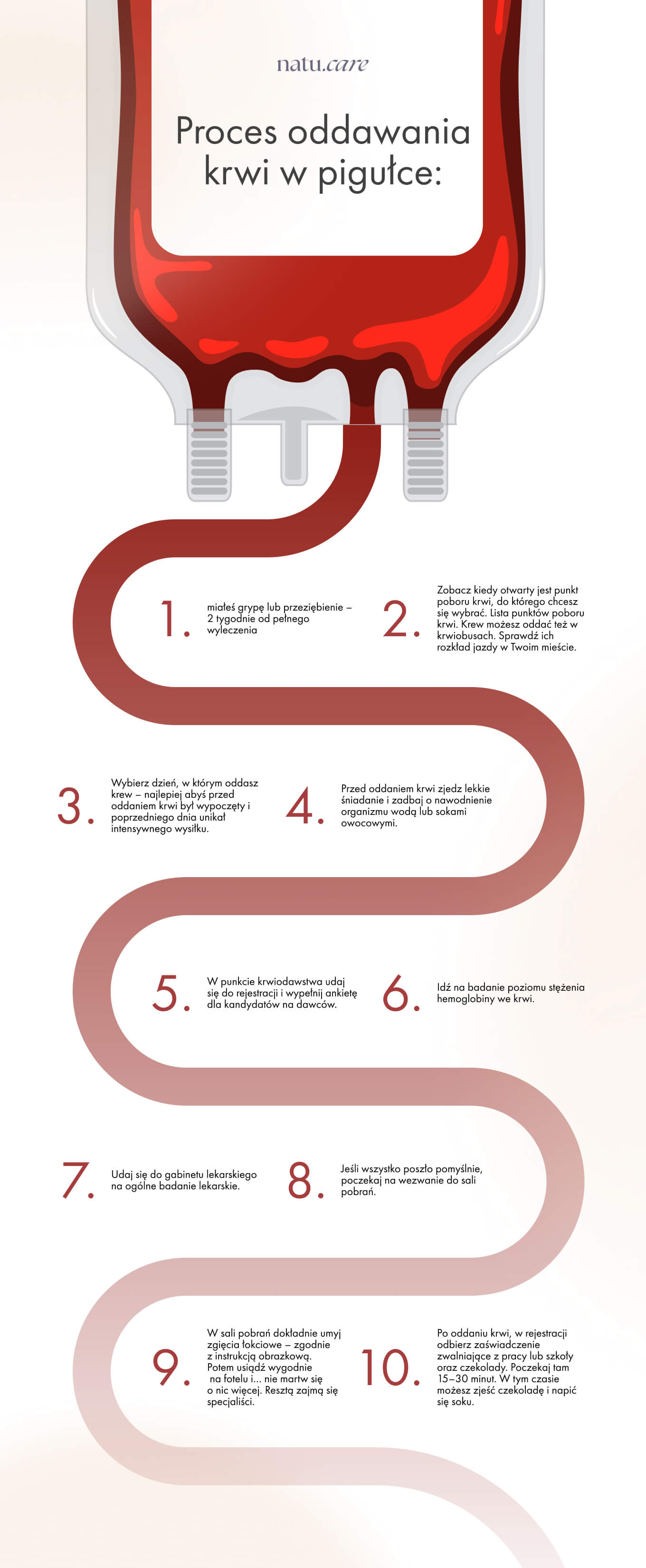
When you arrive at the donation point, first go to registration. This is where you will fill in a donor candidate questionnaire and sign a consent form for blood donation. You will also receive a wrist band with your individual donation number. You will later be directed to an initial blood draw.
.Staff will draw a small amount of blood to test your haemoglobin level. If you are donating blood for the first time, blood for the test will be drawn in the traditional way - from a vein in the forearm.
If you are donating for the first time, blood will be drawn in the traditional way - from a vein in the forearm.
If you have already donated blood, this test can be carried out using a device to measure haemoglobin levels by finger pricking. An increasing number of donation centres also have equipment that does not require a prick at all.
If you have already donated blood, the test can be carried out using a device that measures haemoglobin levels by finger prick.
If the haemoglobin level in your blood is within normal limits, i.e. >125 g/l (in women) or >135 g/l (in men), you can donate blood.
When you make your first donation, your blood type will also be determined.
The final stage you need to go through is a visit to the doctor's office. The doctor will assess your general health and ask you some additional questions. He will also measure your blood pressure, pulse and temperature. He or she will make the final decision on whether you will be able to donate blood.
.If the doctor has ruled that blood can be taken from you, you will be directed to the collection room. There you will find, among other things, a sink and washing and disinfecting agents. Near the sink you will see graphic instructions on how to wash your hands and the bends of your elbows. Once you have complied with it, you can sit down on the blood collection chair.
The nurse will prepare the equipment and blood containers and label them with the donation number you were assigned at registration. She will then disinfect the area where the needle will be inserted. From this point onwards, you can no longer touch it.
When the bend of your elbow dries, the nurse will insert the needle into the vein and the blood will start to flow into the container on its own.
How long does it take to donate blood?
.Donating a full unit of blood (450ml) takes less than 10 minutesand. However, you will need to set aside more time for your visit to the collection centre. Usually the registration, testing and collection takes about an hour in total. Also bear in mind that you will need to sit in the waiting room for 15-30 minutes after donating blood to make sure you feel comfortable.
How much blood is collected during one donation?
.For full blood donations, 450ml, or a full unit, is taken at one timeand.
If you choose to donate plasma, the maximum amount is determined by your gender, height and weight. Averaging this is about 10 ml for every kilogram of body weight, but no more than 650 mland. Taking more carries with it the need to replenish circulating blood volume.
To replenish the energy expenditure, after donating blood you will receive:
- 8 chocolates, .
- waffle, .
- juiceand. .
The waffle and juice are perfect to eat before you even leave the collection point. Eat boldly and with impunity.
Interesting fact:
.The absolute record holder in blood donations is Mr Andrzej Lis from Stary Sącz. The man has donated over 100 litres of blood during his lifetime! This is a hero who makes Superman look weak.
Absolute record for blood donations.
What are the rewards for donating blood?
.Blood donors typically cite as the greatest reward the joy of selfless help and the knowledge that their gesture saved someone's health or life.
When Agatha was leaving her mum at the hospital the previous day, all she heard from the doctor was: "We will roll. We'll see." Now, opening the hall door, she had a soul on her shoulder. Sepsis is a virulent disease. Fortunately, a blood transfusion helped.
"When I saw my mother, it was like seeing a different person. She even had a slight blush and her condition improved enough for me to talk to her normally. It was the first time in many days".
However, blood donors are also honoured in other ways. You will read about that below.
Interesting fact:
.In theory, blood donation is free of charge in the European Union, but some States have introduced 'reimbursement' for expenses and losses incurred (e.g. for not doing your paid work)and. High compensation can be obtained in Austria (up to €50) and Germany (up to €25), among other countries.
How to become an honorary blood donor?
.It is very simple - anyone who has donated blood free of charge at least once is an honorary blood donor. People who regularly donate blood can be awarded the Badges of Meritorious Honorary Blood Donor of the 3rd, 2nd or 1st degree. Whether and which badge you get depends on how much blood you have donated. See:
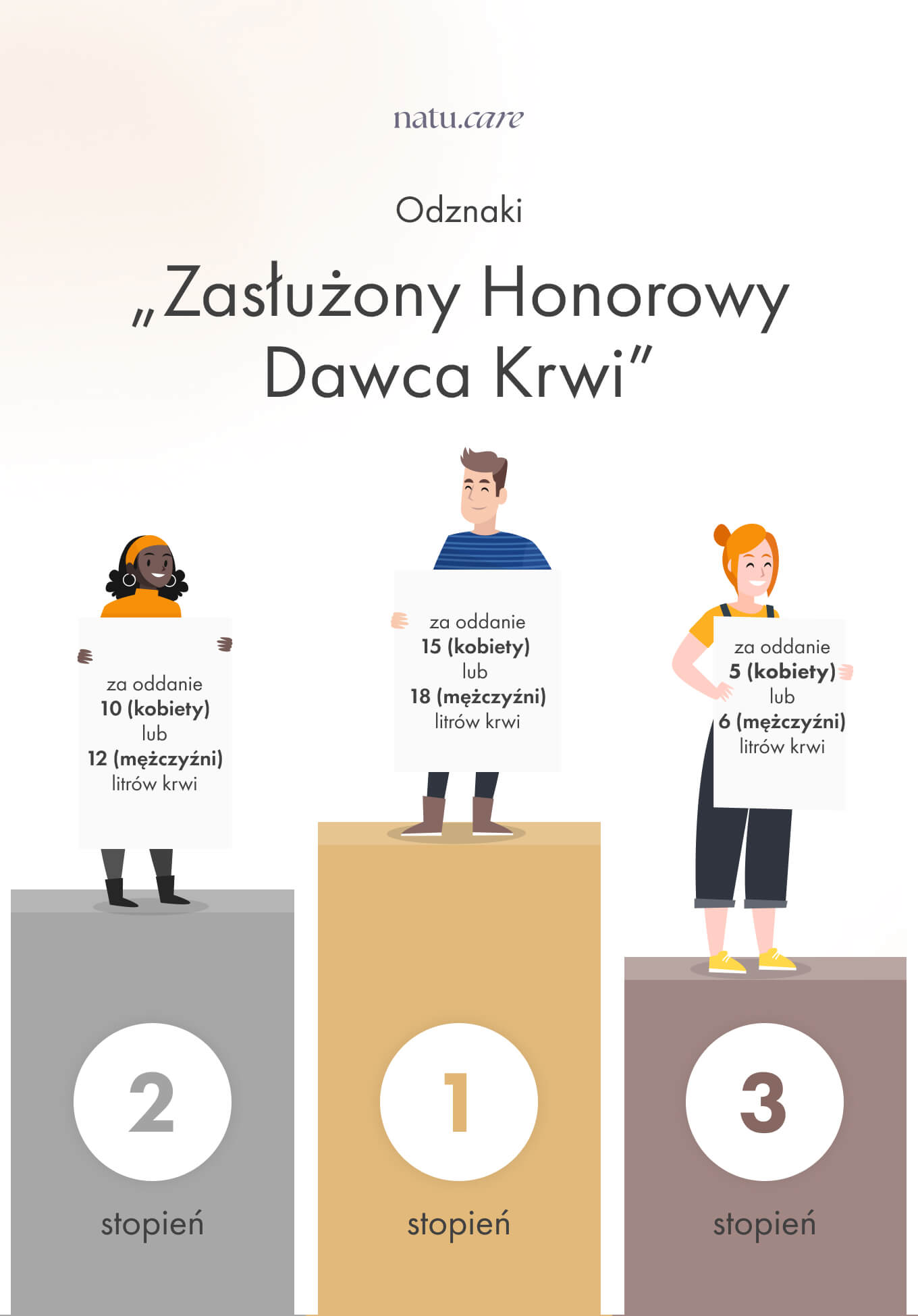
These badges, along with the Distinguished Honorary Blood Donor card, are issued by the Polish Red Crossand.
Other privileges
.Everyone who donates blood is entitled to:
.Free at work and school for two days
.From 20 April 2023, anyone who has donated blood is entitled to two days off.
You will obtain the exemption at the registration desk of the collection centre where you donated blood. It applies to the day you turned up for the collection and the following day. If, for medical reasons, your blood donation did not take place, you will obtain a release for a few hoursand.
Please note that you will not be able to take any more time off.
Remember to give your employer advance notice of any planned absence related to blood donation.
.Reimbursement of travel expenses
.You may be reimbursed for the tickets you bought to travel to the nearest donation centreand. You will usually get a refund at registration. PS. This is a free one-way trip only. You'll have to pay your own way back.
Tax relief
.You can deduct donated blood from your tax on your PIT. You calculate the amount of the deduction by multiplying the amount of blood donated in a given tax year by a specific amount (currently £130). This amount is the cash equivalent for 1 litre of blood. If you donate 2 litres of blood this year, you will be able to deduct PLN 260 from your tax.
.The amount of the blood donation deduction cannot exceed 6% of the income you reported on your PITand.
.Blood test results
.After donation, your blood will be tested for:
.- haemoglobin level, .
- fibres, .
- HIV, .
- hepatitis B and C, .
You can get your test results free of charge within a few days of donation. All you need to do is request this when registering at the point of collection.
Important
If your blood test results reveal a medical condition, staff will contact you to let you know.
People who have donated blood more than once are entitled to:
.Reduction on train and bus tickets
.Persons who have donated blood (or blood components) at least 3 times (including plasma at least once after COVID-19) are entitled to a 33% discount on national transport tickets during an epidemic emergency or state of epidemic and.
The concession applies to tickets:
.- bus tickets, .
- passenger and fast trains (1st and 2nd class),
- other tickets.
- other trains (2nd class), .
BloodCard
The BloodCard is an identification card for your blood group. You can get it free of charge or for a small fee, after you have made a few blood donations.
Deserved Honorary Blood Donors are entitled to:
.Discount on medicines
.Deserved Honorary Blood Donors have discounts on certain medicinesand. To czy dany środek jest objęty ulgą możesz sprawdzić na stronie KtoMaLek.co.uk. In order to receive relief, the prescription must be issued by a public healthcare doctor or one who has a relevant contract with the National Health Service.
.Unfortunately, you will not be able to redeem the relief on prescriptions from most private clinics.
Health care without queues
.On the basis of your "Meritorious Honorary Blood Donor" card, you can use healthcare services and buy from pharmacies without waiting in line. Checkmate the NHF.
.As a "Deserved Honorary Blood Donor" you will also get a sanatorium faster. Checkmate times two.
Discount on public transport
.The amount of discounts and which Distinguished Honorary Donors receive them depends on the regulations in specific cities. The most common discount is 50%, 75% or 100% and can be given to Deserved Honorary Blood Donors of the first degree. You can check the list of cities and the conditions for concessions at blood donors.org.
Even more discounts
.The Donors in Giving initiative brings together various entities that give discounts to Deserving Honorary Blood Donors. On the website (linked above) you will find lists of: hostels, hotels, tourism companies, cultural centres and catering establishments that offer discounts on their products and services.
Why can you donate blood?
.Blood can be donated every eight weeks, but no more than six times a year (men) and four times an eye (women)and.
Blood components such as platelets can be donated every four weeks, up to a maximum of 12 times a year .
Plasm can be donated most frequently, as often as every fortnight, but no more than 25 litres can be donated in a year .
.Can you donate blood during your period?
.You cannot donate blood during menstruation and three days after the end of menstruation. This restriction applies even to those women who have very scanty periods. Choose a different date. Your body has a harder time during this time anyway.
.Is blood donation healthy?
.In the 2022 study, blood donors themselves were asked about the impact of regular blood donation on the body. According to the majority, blood donation is not addictive, nor does it overproduce bloodand.
More than 81% instead admit to having a better mental wellbeing after donating blood. As you can easily guess this is due to the knowledge that they have done something good.
Can we say that donating blood is healthy? Looking at mental wellbeing - yes. Considering our physical wellbeing, blood donation is neutral to our health.
Blood donation is not healthy.
Gaps in donated blood are replenished by our body in the same way as those caused by cuts or nosebleeds.
.Interesting fact
.Your body will replenish the loss of 450 ml of blood donated during a single donation in as little as 3-4 days.
What are the side effects after donating blood?
.Let's be clear: blood donation is safe. For healthy individuals, studies show no long-term side effects associated with blood loss during donationand.
The most common side effect occurring immediately after blood donation is a feeling of fatigue and weakness. Some people may experience fainting, but these are occasionaland. Vein, artery and nerve damage is even rarer.
A Polish study examining complications from donations performed from 2005 to 2013 reported only 0.66% of complications, almost all of which were minor complications.
Does donating blood hurt?
.No, donating blood is not painful. You will only feel a sting. Exactly the same as when you draw blood for a normal test.
Why does it hurt?
With which medicines can you not donate blood?
.Taking most medications will exclude you temporarily from donating blood. Even the common aspirin will make you ineligible to donate.
Blood donation.
For some preparations, the period of disqualification will pass when you stop taking them. With others, you will additionally have to undergo the withdrawal period needed for the drug to clear out of your system.
If you are taking aspirin, you will be disqualified for donation.
If you are taking or have recently taken medication and wish to donate blood, please consult your doctor.
What medications are not a contraindication to blood donation?
.Taking dietary supplements and vitamins is not a contraindication to donating blood. Many women think that taking hormonal contraception excludes them from becoming a blood donor. This is not true. If you are taking hormonal contraception, you can donate blood.
See also:
.FAQ
.Can you donate blood if you have hypothyroidism?
.No. Diseases of the thyroid, such as hypothyroidism or hypothyroidism are diseases of the endocrine system. This means that they are a contraindication to blood donation and disqualify a donor candidate.
Can you donate blood with Hashimoto's?
.You cannot donate blood if you suffer from Hashimoto's disease. This condition is one of the diseases of the endocrine system and excludes a donor candidate from donating blood.
Why do doctors not donate blood?
.It cannot be said that doctors do not donate blood. However, some medical specialties (e.g. surgery) are associated with an increased risk of infection with blood transfusion-transmissible diseases. This may be a disqualifying criterion for these individuals from blood donation.
Is it permissible to drink coffee prior to blood donation?
.Yes, you can drink coffee before donating blood. This is especially true for people for whom this is a morning ritual. Coffee and tea have no significant effect on the quality and parameters of your blood. Just remember that coffee can be diuretic and slightly dehydrating, so drink plenty of water before donating.
Can you donate blood if you have high blood pressure?
If you suffer from high blood pressure, you can donate blood during a period of so-called stabilised blood pressure - after a positive decision by your doctor at the blood collection centre. However, if you are actively treated and taking medication for hypertension, you cannot become a donor. The substances you take could adversely affect the health of the person who would receive your blood.
Can you donate blood if you have herpes?
.No. Herpes is a viral disease, caused by viruses of the Herpes simplex virus group. This means that, like other mild viral diseases, it temporarily excludes you from donating blood. Donation will not be possible until two weeks after the herpes has been cured.
Can you donate blood after taking painkillers?
.After taking most common painkillers containing ibuprofen or ketoprofen, you cannot donate blood for two days. If you have taken an anti-pain drug before your appointment at the collection centre, unfortunately - you will need to reschedule.
Resources
.See all
.Makowicz, Dawid, Renata Dziubaszewska, Katarzyna Lisowicz, and Natalia Makowicz. "Impact of Regular Blood Donation on the Human Body; Donors' Perspective. Donors' Opinion on Side Effects of Regular Blood Donation on the Human Body". Journal of Transfusion Medicine 15, no. 2 (2022): 133-40. https://doi.org/10.5603/JTM.2022.0011.
"EUR-Lex - 52006DC0217 - EN". Text/html; charset=UTF-8. OPOCE. Accessed 26 May 2023. https://eur-lex.europa.eu/legal-content/PL/TXT/HTML/?uri=CELEX%3A52006DC0217.
.'Facts and myths about blood donation | Ministry of Health'. Accessed 26 May 2023. http://www.archiwum.mz.gov.pl/zdrowie-i-profilaktyka/krwiodawstwo/fakty-i-mity-dotyczace-krwiodawstwa/.
.GUS. "Blood donation in 2017" stat.gov.pl. Accessed 26 May 2023. https://stat.gov.pl/obszary-tematyczne/zdrowie/zdrowie/krwiodawstwo-w-2017-r-,18,1.html.
"Area and population by territory in 2022". stat.gov.pl. Accessed 26 May 2023. https://stat.gov.pl/obszary-tematyczne/ludnosc/ludnosc/powierzchnia-i-ludnosc-w-przekroju-terytorialnym-w-2022-roku,7,19.html.
Honor blood and blood donation. "Questionnaires for blood donor candidates". Accessed 26 May 2023. https://krwiodawcy.org/ankiety-dla-kandydatow-na-dawcow.
Honor blood and blood donation. "Blood donor testing". Accessed 26 May 2023. https://krwiodawcy.org/badania-u-dawcy-krwi.
Honor blood and blood donation. "The donor journey - a guide". Accessed 26 May 2023. https://krwiodawcy.org/droga-dawcy.
Honor blood donation and bloodletting. "Benefits of HDK." Accessed 26 May 2023. https://krwiodawcy.org/korzysci-z-hdk.
Honor blood donation and blood donation. "Malaria disqualification." Accessed 26 May 2023. https://krwiodawcy.org/malaria-dyskwalifikacja.
Honorary blood donation and bloodletting. "Badges." Accessed 26 May 2023. https://krwiodawcy.org/odznaki.
Honor blood and blood donation. "Contraindications to blood donation. Methods of blood collection." Accessed 26 May 2023. https://krwiodawcy.org/dyskwalifikacje.
Honor blood donation and haemorrhage. "Intervals between donations". Accessed 26 May 2023. https://krwiodawcy.org/przerwy-miedzy-donacjami.
Honorary blood donation and blood donation. "Public transport concessions". Accessed 26 May 2023. https://krwiodawcy.org/ulgi-w-komunikacji-miejskiej.
bloodbreeders.org. "Epidemiological Situation Update. Honorary Blood Donation and Blood Services (blog), 17 September 2015. https://krwiodawcy.org/aktualizacja-sytuacji-epidemiologicznej.
'Blood donation | FAQs-Frequently asked questions'. Accessed May 26, 2023. https://krwiodawstwo.pl/dla-krwiodawcy/faq/.
HDK Legion. "Does every drug exclude you from donating blood?". Accessed 26 May 2023. https://legionhdk.pl/krwiodawstwo/mity-w-krwiodawstwie/czy-kazdy-lek-wyklucza-z-oddania-krwi.
The HDK Legion. "Does blood regeneration take a long time?" Accessed 26 May 2023. https://legionhdk.pl/krwiodawstwo/mity-w-krwiodawstwie/czy-regeneracja-krwi-trwa-dlugo.
National Blood Centre. "Frequently Asked Questions - National Blood Centre - Gov.co.uk Portal". Accessed 26 May 2023. https://www.gov.pl/web/nck/czesto-zadawane-pytania.
National Blood Centre. "Disqualifications - National Blood Centre - Gov.co.uk Portal." Accessed 26 May 2023. https://www.gov.pl/web/nck/dyskwalifikacje.
"Announcement by the Speaker of the Sejm of the Republic of Poland of 20 February 2014 on the announcement of the consolidated text of the Act on the Public Blood Service". Accessed 26 May 2023. https://isap.sejm.gov.pl/isap.nsf/DocDetails.xsp?id=WDU20140000332.
"RCKiK in Warsaw | Donating blood for the first time". Accessed 26 May 2023. https://www.rckik-warszawa.com.pl/oddaje-krew-po-raz-pierwszy.
"Regional Centre for Blood Donation and Haemorrhage in Opole". Accessed May 26, 2023. https://www.rckik-opole.com.pl/krwiodawstwo-Jak-sie-odzywiac-przed-oddaniem-krwi-28-1.html.
"Regional Centre for Blood Donation and Haemotherapy in Wrocław". Accessed 26 May 2023. https://www.rckik.wroclaw.pl/krwiodawstwo-Jak-przygotowac-sie-do-oddania-krwi-10-3.html.
"Regulation of the Minister of Health of 11 September 2017 on the conditions of blood collection from blood donor candidates and blood donors". Accessed 26 May 2023. https://isap.sejm.gov.pl/isap.nsf/DocDetails.xsp?id=WDU20170001741.
"Act of 20 May 2016 amending the Public Blood Service Act and certain other acts". Accessed 26 May 2023. https://isap.sejm.gov.pl/isap.nsf/DocDetails.xsp?id=WDU20160000823.
"Act of 21 January 2021 on amending the Act on special solutions related to the prevention, prevention and control of COVID-19, other infectious diseases and emergencies caused by them and some other acts", n.d. https://isap.sejm.gov.pl/isap.nsf/DocDetails.xsp?id=WDU20210000159
Access 26 May 2023.https://krwiodawcy.org/statystyki/.
Editorials
Meet the team

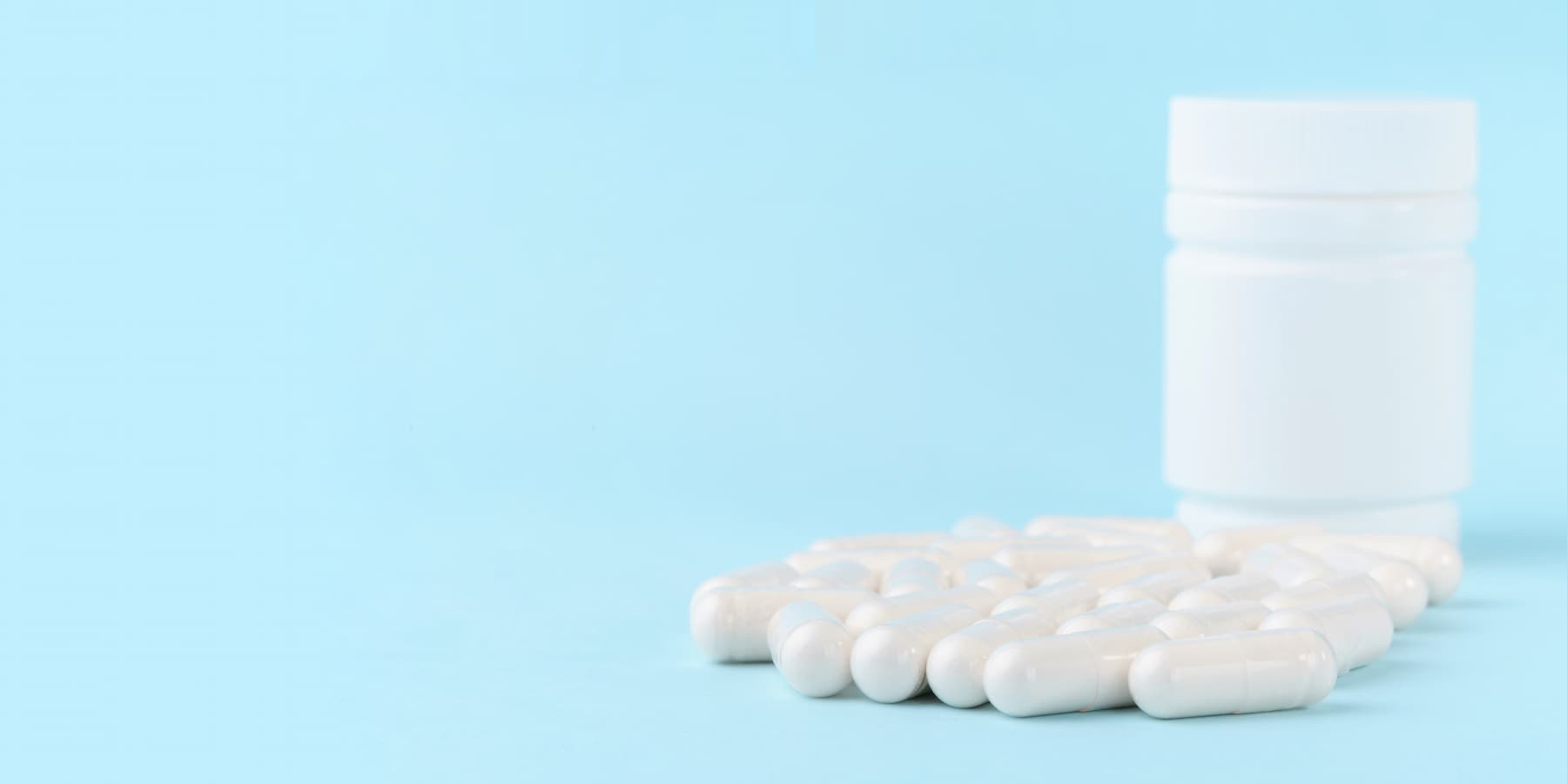
Chondroitin helps the joints and other elements of the body.

Glutathione is one of the most potent antioxidants for supporting the body's health. Find out how it works and where to get it from.

See why hip joints hurt and how to treat their ailments.
